With Election Day just over two weeks away, Muckraker brings you part two of our roundup of gubernatorial races with important green angles. Last week, in part one, we chronicled the hottest campaigns along the Eastern seaboard. This week, we’re briefing you on a few of the must-watch races in the Midwest and Pacific regions.
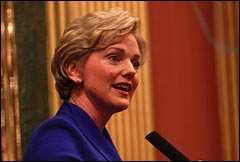
Jennifer Granholm.
Photo: Michigan.gov
Michigan: Jennifer Granholm (D) vs. Dick DeVos (R)
Michigan Gov. Jennifer Granholm (D), who’s running for a second term, faces stiff competition from Republican Dick DeVos, a businessman who’s spent much of his career building his father’s multi-billion-dollar pyramid-marketing empire, Amway Corp. “This has been one of the closest governor’s races in the country,” says the Sierra Club’s national political director, Cathy Duvall, whose group is backing Granholm. “Almost nowhere else do you see a more striking contrast between a stellar, hard-won environmental record and an anti-environmental agenda.”
DeVos, an ultra-conservative, has already spent $21 million since February on his campaign, more than $16 million of which came from his own pocket. Despite his scant political experience, critics say DeVos’s anti-environment leanings are evident in the agendas of the right-wing organizations he has funded. Among them is the Acton Institute, a libertarian outfit (of which his wife is treasurer) that railed against the Kyoto Protocol, according to the Detroit Metro Times. He has also financed the Mackinac Center for Public Policy, which supports drilling for oil under the Great Lakes and selling off state parks. According to Sierra Club’s Leigh Fifelski, DeVos also supports weakening environmental regulations on large-scale livestock and poultry operations. “This guy appears to be about as cozy with industry as it gets,” says Lisa Wozniak, executive director of Michigan League of Conservation Voters. “Unfortunately, that wins you a lot of political support in [an industry-heavy] state like ours.”
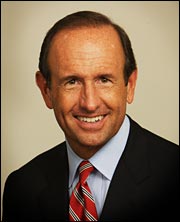
Dick DeVos.
Photo: DeVos for Governor
No one knows this better than Granholm, who has fought — and won — many an uphill environmental battle as governor. Her plan to reduce mercury emissions from coal-burning power plants 90 percent by 2015, for instance, drew much caterwauling from industry, but she pushed it through anyway. She has promoted the development of clean energy sources such as wind farms, and committed to creating a state-wide renewable portfolio standard that will set hard targets for clean electricity production (the details have yet to be ironed out). Enviros also applaud her support for raising a “tipping fee” to help stem the voluminous tide of garbage that flows from other states and Canada into Michigan landfills. While Granholm has not come out in support of more ambitious fuel-economy standards (“You most likely couldn’t be elected governor in this state if you did,” says Wozniak), she has worked to broker conversations between greens and Detroit. “She’s a visionary 21st-century leader, and we’re doing all we can to keep her in power,” Wozniak says.
Granholm had enjoyed widespread popularity and national recognition during her first couple of years in office, but her stature’s been hurt by high unemployment and a weak economy in the state, both due in part to Detroit automakers’ floundering fortunes.
A recent EPIC-MRA poll gave Granholm a narrow lead over DeVos of 46 percent to 40 percent, with a 4 margin of error.
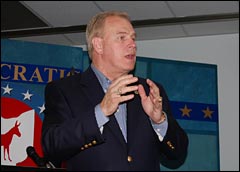
Ted Strickland.
Photo: tedstrickland.com
Ohio: Ted Strickland (D) vs. Ken Blackwell (R)
Democrat Ted Strickland is whomping Republican Ken Blackwell in Ohio’s gubernatorial race, much to the relief of the state’s enviros. Strickland has earned a 77 approval rating from the national League of Conservation Voters for his six terms in Congress representing Ohio’s 6th district — decent rather than impressive, but the environmental community is staunchly supporting him nonetheless. “Ohio isn’t exactly a green state, so he’s got a strong record in that context,” says Bill Demora, head of the Ohio League of Conservation Voters. “We’re very proud to back him.”
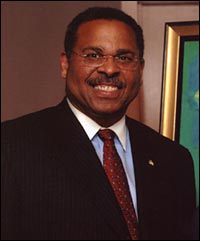
Ken Blackwell.
Photo: kenblackwell.com
Strickland looks particularly likable when you consider the opposition — Ken Blackwell, a multimillionaire who’s closely linked to the religious right and so conservative that he’s alienated even many Republicans. Blackwell has not amassed much of an environmental record in his current position as Ohio’s secretary of state nor in previous roles as mayor of Cincinnati and undersecretary of Housing and Urban Development under the first President Bush, and he’s been keeping mum about environmental issues during his run for governor. His campaign website does not outline any environmental goals, and he declined to speak with OLCV about his environmental platform.
Strickland, in contrast, “spent 70 minutes with state environmental groups hashing out his goals,” Demora says. Among them, he plans to dedicate 30 percent of state bonds — an estimated $250 million, according to his campaign website — to energy-efficiency research and clean-energy job development. He also plans to conduct the first audit of the state government’s energy use and curb that energy use 5 percent in his first year in office and 15 percent within five years.
A recent SurveyUSA poll shows 60 percent of likely voters favoring Strickland, while 32 percent back Blackwell.
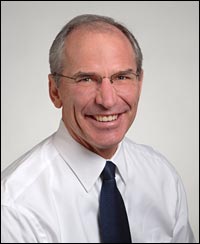
Bob Beauprez.
Photo: house.gov
Colorado: Bill Ritter (D) vs. Bob Beauprez (R)
An open governor’s slot in Colorado has made for a feisty race between former Denver District Attorney Bill Ritter (D) and U.S. Rep. Bob Beauprez (R). Beauprez is the first gubernatorial candidate whom LCV has added to its “Dirty Dozen” list of candidates it most hopes to defeat — an honor traditionally reserved for Senate and House contenders. During his two terms in Congress, Beauprez has earned a 5 percent approval rating from LCV (yes, that’s out of a possible 100). “This guy’s record is so abysmal, and so out of touch with the interests of Colorado voters, we had to break tradition,” said LCV’s Tony Massaro.
Beauprez has voted in favor of fast-tracking drilling for oil and natural gas and exempting drilling activities from the Clean Water Act and Safe Drinking Water Act — sensitive issues in Colorado, which has seen heavy energy development in recent years. Some enviros satirically refer to Beauprez as “The Elk Whisperer” because he’s championed a program to push elk populations off energy-rich land and into new habitat. “How he plans to move elk off migration patterns they’ve had for thousands of years, we don’t know,” says Carrie Doyle, executive director of the Colorado Conservation Voters. Environmentalists in Colorado are particularly flummoxed by Beauprez’s support for a proposal to cut more than $20 million from the National Renewable Energy Laboratory, which is headquartered in his state. Beauprez also infuriated enviros when he backed a proposal to funnel up to $4 billion in state funding to dam-building, says Doyle, and lost face when the proposal was roundly defeated.
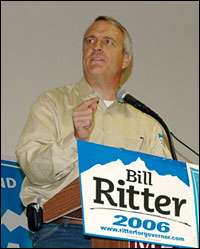
Bill Ritter.
Photo: ritterforgovernor.com
Ritter, by comparison, is applauded by greens for creating an “environmental crimes” unit as assistant district attorney to crack down on corporate polluters. Though his environmental record is otherwise fairly inchoate, he has outlined a strong platform. “Our state has some of the highest potential for wind and solar energy production, and Ritter has seized on that as a cornerstone of his platform,” says Doyle. Ritter has expressed support for an ambitious target that would require Colorado utilities to generate 20 percent of their electricity from renewable sources by 2015, and has promoted water conservation and reuse plans over river-damming projects.
According to a recent Mason-Dixon poll, Ritter currently has a 15 percent lead over Beauprez, with support from 50 percent of likely voters compared to Beauprez’s 35 percent.
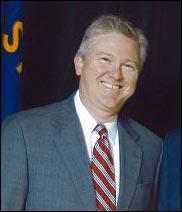
Ron Saxton.
Photo: votesaxton.com
Oregon: Ted Kulongoski (D) vs. Ron Saxton (R)
“To be really blunt with you,” Oregon’s Republican gubernatorial candidate Ron Saxton recently told a business group, “I’m not running for governor to deal with global warming.” That’s an understatement coming from the conservative corporate lawyer who has publicly opposed state-level climate regulations. He’s also made numerous other “really blunt” anti-environment comments that have outraged Oregon green groups and deepened their support for Democratic incumbent Ted Kulongoski.
In this nail-biter of a race, global warming has emerged as a hot issue, “eclipsing the usual knock-down fights over wilderness, endangered species, and timber policy,” according to a recent article in the Oregonian. Kulongoski — endorsed by the Oregon League of Conservation Voters, the Oregon chapter of the Sierra Club, and Oregon Wild (formerly the Oregon Natural Resources Council) — has backed a number of progressive climate strategies. He led the state to adopt California’s stricter automobile standards, which will limit greenhouse-gas emissions from new cars and light trucks starting in the 2009 model year. He has also been a champion of renewable energy, and is pushing an ambitious clean-energy target that would require Oregon utilities to generate 25 percent of their power from renewable sources by 2025. Not only does Saxton oppose such a program, he has summarily dismissed the viability of clean-energy technologies such as those that tap wind and geothermal power. “They’re gimmicks and they could turn into very expensive gimmicks,” The Register-Guard quotes him as saying.
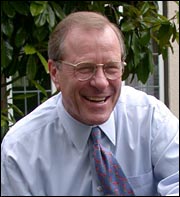
Ted Kulongoski.
Photo: governor.state.or.us
Kulongoski has joined conservation and tribal groups in suing the Bush administration over dam operations that harm Snake River salmon. He has also “aroused the ire of the timber industry by supporting the Clinton-era roadless rule and opposing the Bush administration’s efforts to weaken forest protections,” says Jonathan Poisner, executive director of OLCV. Saxton, in contrast, has received $1.1 million in campaign funding from timber interests. Says Poisner, Saxton is “blowing away every campaign fundraising record in this state’s history — all the traditional business interests have flung their pocketbooks wide open.”
Saxton, who ran for governor in 2002 and lost to Kulongoski, has out-raised his opponent $5.3 million to $3.1 million this time around, which is propelling his unexpectedly successful campaign against the incumbent. According to the latest poll from Riley Research Associates, the two candidates are in a dead heat: 39 of likely voters say they’ll support Saxton, and 37 percent say they’ll back Kulongoski. The poll has a 4 percent margin of error.
California: Arnold Schwarzenegger (R) vs. Phil Angelides (D)
In the Golden State, both candidates in the race for governor could be dubbed environmental golden boys.
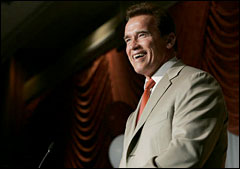
Arnold Schwarzenegger.
Photo: gov.ca.gov
Gov. Arnold Schwarzenegger (R) has unleashed a rapid-fire succession of historic environmental achievements in recent weeks and months, culminating with his signing of landmark legislation to reduce greenhouse-gas emissions in the state 25 percent by 2020. And just this week he signed California on to the Northeast’s carbon-trading program, the Regional Greenhouse Gas Initiative. Schwarzenegger has come to represent a new kind of Republican, a moderate counterweight to the conservative, anti-environmental leadership in Washington — or, depending on your view, an old-school Republican in the mold of Teddy Roosevelt, who saw conserving the environment as part and parcel of a conservative agenda.
California’s environmental establishment, nevertheless, is maintaining its support for Democratic candidate Phil Angelides, who’s built up a strong green record as state treasurer, investing heavily in renewable-energy development, and has been campaigning on an ambitious environmental platform.
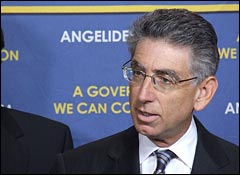
Phil Angelides.
While enviro groups in the state applaud Schwarzenegger’s recent moves, they argue that on the whole his record has been inconsistent. They point, for example, to his veto last month of a bill that would have slashed toxic air pollutants from the big shipping ports at Long Beach and Los Angeles. Tom Adams, board president of the California League of Conservation Voters, went so far as to characterize Schwarzenegger’s signing of the climate act as a political stratagem — “an election-year ploy to establish environmental credentials a mere 41 days before voters go to the polls” and an attempt “to mask his overall weak environmental record.”
And yet Schwarzenegger has amassed a number of impressive environmental achievements during his tenure. He pushed through a version of his Million Solar Roofs initiative, which offers substantial subsidies for solar systems on residential and commercial buildings. He is petitioning the Bush administration to protect roadless areas in California’s national forests. He has backed the state’s requirement that automobiles sold in California have lower greenhouse-gas emissions starting in the 2009 model year, despite aggressive pushback from Detroit. In all, environmental concerns look to be a focus for the governor, not an afterthought.
California voters — known to favor candidates with strong environmental records — seem to agree. A new poll by Rasmussen Research shows Schwarzenegger leading by 9 points, with 49 percent support compared to 40 percent for Angelides.


